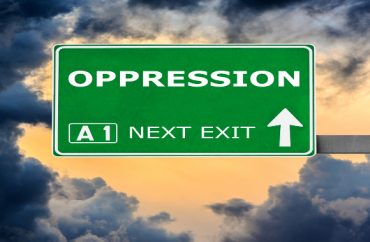
Since there’s an apparent dearth of teachings on American campuses these days regarding the marginalization and/or privilege of folks based on race, gender, and sexuality, the North Carolina State Office of Institutional Equity and Diversity played host to its “Tunnel of Oppression” event Tuesday through today.
The tour “through several rooms” of the Talley Student Union showed “different way[s] of viewing oppression,” as reported by the Technician.
Students at first were indoc–, er, shown a slideshow demonstrating what oppression and privilege “look like in everyday life,” followed by a stop where 20 questions pertaining to “unrecognized privileges” were asked.
Business major Anusha Tamhane said “[The Tunnel of Oppression] was thought-provoking. You don’t see stuff like this talked about in class, with professors or everyday friends, but it’s still happening.”
Perhaps that’s because business classes usually deal with topics of substance, Anusha.
The third room contained five individual skits, each intended to show an example of contemporary oppression the NC State students may face in their everyday lives. The skits focused on mental health, the need for civil rights in the modern United States, sexual assault, transgender bathroom rights and racial discrimination.
“The most memorable scene that they acted out was when the trans- person tried to use the bathroom and was almost physically assaulted,” said Heather Michno, a sophomore studying creative writing. “It’s something that I see in the news. It’s actually happening that people are physically assaulted for trying to go to the bathroom.”
MORE: Fix reporter’s brave journey through ‘Tunnel of Oppression’
The skit Michno described involved an individual masquerading as a transgender person attempting to use the bathroom being confronted by an angry man who both verbally accosted and physically prevented the transgender person from using the bathroom. The scene ended with the confrontation almost resulting in physical violence.
“Oppression is all around us every day,” said Renee Wells, the director of the GLBT Center. “We often don’t see it because it’s something that’s been normalized and if there’s anything that we, as individuals and as citizens of humanity should do, it’s to be able to recognize oppression that’s happening and ideally, to interrupt it.”
If students’ collective self esteem was drained after these skits, fear not, for the “empowerment room” followed: Participants could either rewrite “a demeaning word into a productive one,” make a pledge to thwart an experience of oppression, or “writ[e] down a hurtful word and throw […] it in a trash can.”
How cathartic.
Meanwhile, Campus Reform reports that placards beginning with the words “Dear White People” were placed around NC State’s campus accusing Caucasian students of “perpetuating racism and white supremacy.”
Posters said that “black people can’t be racist,” that “there is no such thing as being colorblind,” and one stated that using the term “African-American” is “borderline racist”: “It turns out if you’re too worried about political correctness to say ‘black,’ odds are you secretly just want to call us n— anyway.”
Read the full Technician and Campus Reform stories.
MORE: University’s ‘Tunnel of Oppression’ exhibit includes Bill O’Reilly
MORE: ‘Sizeism’ joins campus PC lexicon
Like The College Fix on Facebook / Follow us on Twitter
IMAGE: Shutterstock






Please join the conversation about our stories on Facebook, Twitter, Instagram, Reddit, MeWe, Rumble, Gab, Minds and Gettr.